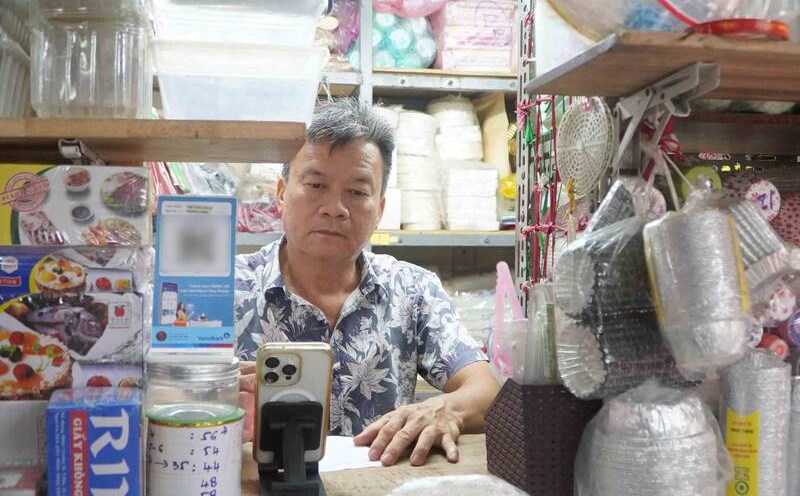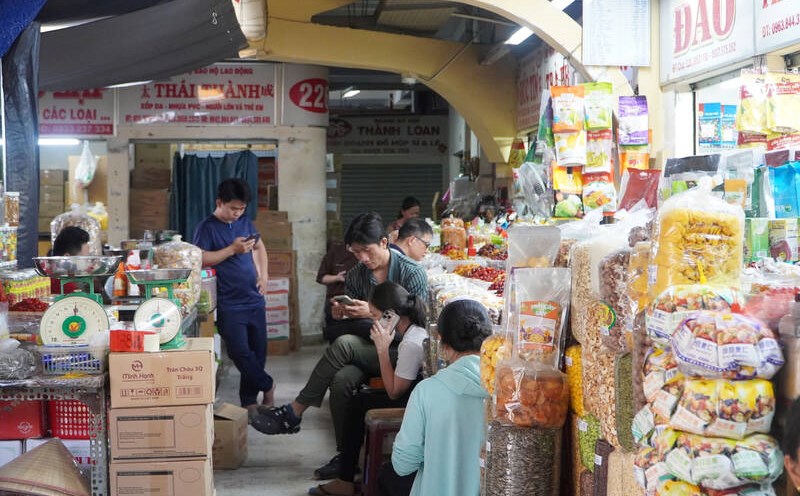Traders close their doors not to "escape taxes"
Dong Xuan market (Hoan Kiem district, Hanoi) in mid-June is quite deserted. On the first floor, customers are only slightly larger than the number of traders looking at the counter. The second floor was sparsely populated, while the third floor - where fashion items were concentrated - was almost deserted. About half of the kiosks were closed, many traders left the stalls and gathered in groups to chat.
Many traders said that no one left the market, but due to a long absence of customers, many had to temporarily close kiosks and return early.
Mr. Khoi (name changed), 39 years old, said that his family has rented 2 kiosks on the 3rd floor of the market and has been in the clothing business for more than 5 years. The rental price is 15 million VND/ homepage/month, the contract tax for each homepage is 3-5 million VND/month.
"The cost is high so it is a pity to close for an hour. But there are no customers, so I open the door just to sit. Therefore, many people choose to retire early and take advantage of other jobs, he said.
Regarding the new regulations on taxes and invoices as well as the origin requirements of goods, Mr. Khoi said that most traders support the policy, but need time to adapt.
The market management board has disseminated the new regulations to business households, however, according to Mr. Khoi, there is currently no mandatory requirement to implement immediately, so most traders still maintain traditional trading methods.
Support the policy but need time to adapt
Ms. Minh Hang, another trader, said that although the new regulations on taxes and goods have not directly affected Dong Xuan market, her partners do not dare to import goods, leading to the goods not being sold. Regarding the new tax regulation, Ms. Hang has some concerns.
"Here, I sell wholesale to acquaintances, sometimes people buy goods but sell slowly, and they return them half a year later. At that time, the goods had lost value a lot, even were damaged and out of fashion. If the invoice has been issued and the goods are returned, how will it be handled? I hope the authorities will have flexible instructions according to the characteristics of each industry" - Ms. Hang said.
Business households should proactively inventory inventories
According to information from the Tax Department, recently, in some localities, many business households have simultaneously stopped selling at the right time when the authorities have launched a peak period of inspection and handling of violations of smuggling, trade fraud and counterfeit goods under the direction of the Prime Minister.
A physical inspection shows that the situation of trading in goods of unknown origin, no invoices, documents, counterfeit goods is still common. At some large shopping malls, many stalls have proactively closed, even moving goods from the business area.
According to Ms. Le Yen - CEO of Hanoi Tax Consulting Company Limited (Hanoitax), the habit of buying and selling without invoices of business households today originates from the previous contract mechanism. The household does not have to have documents, tax declaration, financial reporting or tax settlement. Therefore, most business households do not take invoices when importing goods, leading to the current inventory having mostly no valid documents.
To support business households, Ms. Le Yen recommends proactively inventorying and grouping inventories. For common items such as cosmetics and consumer goods, households can make a list until May 31, 2025 to serve as a basis for issuing invoices after June 1. For sensitive goods such as functional foods and cosmetics with treatment factors, it is necessary to contact the supplier soon to supplement invoices and documents (if possible).
At the same time, the CEO of Hanoitax recommends that the tax authority soon issue official instructions on how to handle inventory without input invoices, including: Accepting a confirmed inventory table of households as a basis for tax calculation when selling after 1.6; Classifying high-risk goods to have a suitable control plan; Sending a clear message that the policy goal is to encourage transparency, not to punish in large numbers.














